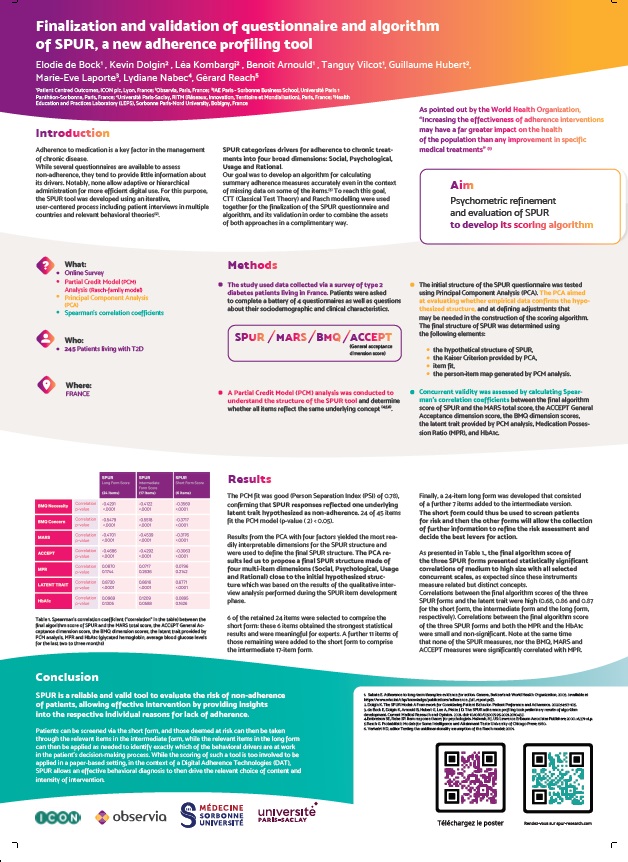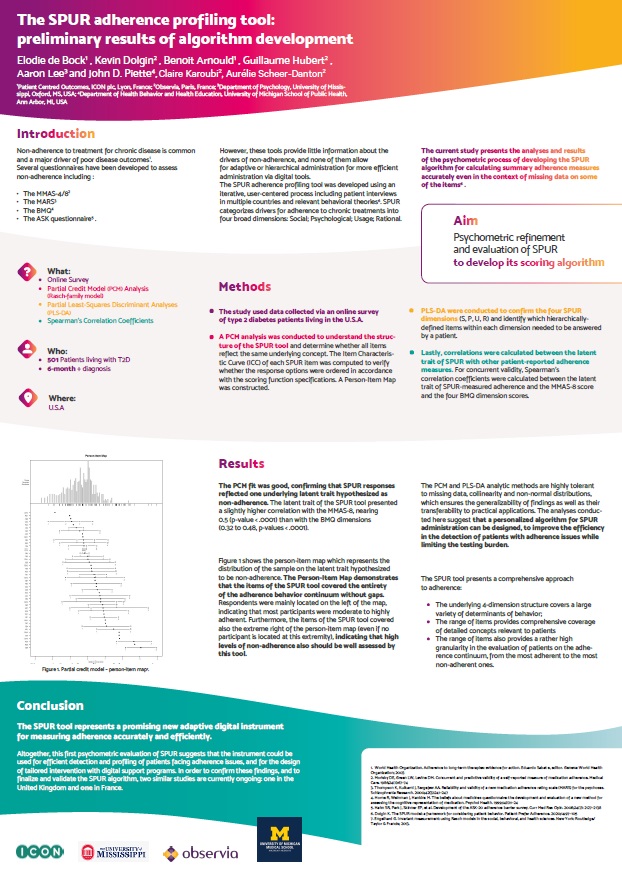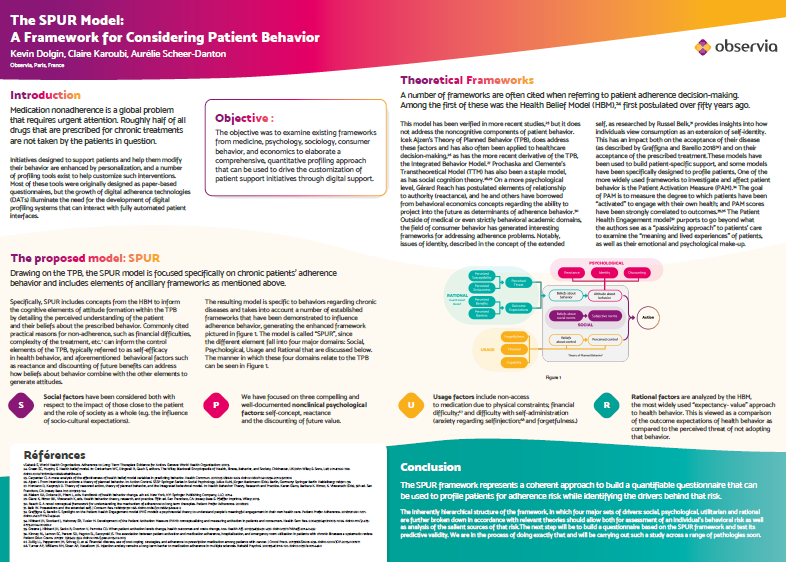Introduction: SPUR, a Valuable Tool for Research
SPUR is a dynamic and predictive self-assessment questionnaire. Over the past 4 years, several tens of thousands of patients have tested SPUR, and our international research protocol validated the tool with the input of 2,500 patients globally. SPUR reliably detects a patient's risk of non-adherence and accurately articulates the reasons for his/her health behavior along four over-arching dimensions: Social, Psychological, Usage and Rational (the initials form the name SPUR).
SPUR is unique insofar as it allows researchers to:
- Understand chronic patients’ behavior holistically,
- Accurately detect the risk of non-adherence, even for naïve patients,
- Limit bias through usage of Likert scale and non-judgmental question phrasing, and
- Adapt suggestions for patient support.
Theoretical Frameworks behind SPUR
SPUR™ aggregates and distills decades of proven theories and models in behavioral science into a single validated digital tool. SPUR’s building blocks were informed by the following theories and models,
- the Health Model Belief, established in the 1950s, which posits that a patient's beliefs in both the threat represented by the illness and the efficacy of the recommended treatment will determine his/her adherence to the recommended behavior,
- the Theory of Planned Behavior, developed in the 1980s, which posits that behavior change requires active decision and planning, and that intentions to perform behaviors of different kinds can be predicted accurately from attitudes toward the behavior, subjective norms, and perceived behavioral control,
- the COM-B model, developed in early 2000s, which identifies three factors that need to be present for any behavior to occur: capability, opportunity and motivation, and
- the Transtheoretical Model of Change, developed in the 1970s, which lays out six stages of intentional change within health behavior change.
Various profiling approaches have built on the successes and addressed the shortcomings of their predecessors. One of the innovations of SPUR is its focus on the motivational dimension, through the evaluation of psychological drivers with demonstrated influence on adherence in chronic patients: rejection of identity as a patient, reactance and discounting of future benefits.
Health Behavior in Four Dimensions
Within the four over-arching dimensions of health behavior, SPUR calculates a score for 13 individual drivers:
History of SPUR's development
The development of SPUR started in 2015. Kevin Dolgin, co-founder of Observia and longtime academic, was unable to find a tool that captured and measured the breadth of behavior of patients with chronic disease, especially in regard to adherence. Dolgin thus conducted a comprehensive literature review, inspired not only by medical literature, but also by psychology and behavioral economics. The result was a new theoretical framework of chronic patient health behavior.
Observia then developed a first version of SPUR, a diagnostic tool based on this theoretical framework. Several patient support programs leveraged this new tool between 2017 and 2020. See more on Observia, the sponsoring organization behind SPUR.
Concurrently, Dolgin and a Board of Experts, with the financial and administrative support of Observia and partners for data analysis, embarked on a comprehensive R&D program to refine the existing tool and scientifically validate a second version of SPUR. This team analyzed and adapted more than 100 existing health questionnaires to create a 45-item questionnaire. Fifty patients tested this questionnaire, in three languages and in four countries The team then reviewed the items for clarity and consistency, before more than 1000 type-2 diabetes patients tested the questionnaire in three patient studies in the United States, France and the United Kingdom.
Of the 45 items that originally came out of psychometric studies, all were used in various studies thereafter leading to the development of a dynamic tool that ranges from 6 to 24 questions. In an early research protocol in the UK, Joshua Wells found 27 items (using factor analysis) that were statistically significant. Later on, studies using advanced statistical methods, namely Rasch modeling, reduced the number to 24 items. In all cases of studies of items for SPUR, the four over-arching dimensions and 13 drivers are fundamentally the same. Therefore, we find that the Rasch modeling added further sophistication and proved the same underlying measurements as earlier, less refined, calculations.
The team developed a 24-question version of SPUR based on the extensive R&D. Analysis of the collected data validated the predictive power of SPUR and its ability to identify patients' behavioral drivers. The new version of the SPUR questionnaire adapts to the patient's responses, from 6 questions to a more detailed section of up to 24 questions. Three research papers have been published or are under review on the basis of this data. See publications here.
Board of experts
SPUR is the result of the collaboration of experts across the globe who contributed their expertise and efforts to build this tool. In 2018, we put together a board of experts in the field of health behavior and digital transformation. They help us ground our innovation in validated theories and assess it in real-life environments.
- Prof. John Piette - Professor Department of Health Behavior Health Education and Co-Director of the Center for Managing Chronic Disease, University of Michigan
- Marie-Eve Laporte - Associate Professor in Management Sciences, Paris IAE - Universite Paris 1 Panthéon-Sorbonne
- Prof. Lydiane Nabec - Professor in Management Sciences, Universite Paris-Sud / Paris-Saclay, France
- Prof. Reem Kayyali, Professor of Clinical and Applied Pharmacy Practice, Head of Pharmacy Department, Kingston University
- Dr. Helen Mosnier-Pudar, Medical Doctor, Endocrinology & Diabetology Department, Cochin Hospital AP-HP
- Prof. Emer. Gérard Reach, Paris 13 University, Quality and Patient Rights Department, Paris-Seine St-Denis University Hospitals AP-HP, Specialist in Patient Education
- Pr. Anoop Chauhan - Consultant Respiratory Physician and Chief Research Officer at Portsmouth Hospitals University and Isle of Wight NHS Trusts.
- Dr. Joshua Wells - Lead researcher at Kingston Hospital NHS Foundation Trust.
Published papers validating or citing SPUR - Free access to all publications
Our SPUR research plan, started in 2017, was divided in 3 phases:
-
Phase 0 aimed at the establishment of our model's academic foundations, through a literature review, a board review and the elaboration of a decision-making framework
-
Phase 1 had two objectives, identifying the questions to be included in SPUR and evaluating the psychometric properties of the questionnaire. This was done through a literature review, a board review and qualitative interviews with patients with diabetes, COPD, breast cancer and multiple sclerosis.
-
Phase 2's goals were to validate the final structure of the SPUR tool and validate the predictive power of the SPUR tool with real-life adherence data through MPR, via a mutli-country quantitative analysis in Type 2 Diabetes and a mutli-pathology approach.
The global outcomes of this research plan is that SPUR reliably detects a patient's risk of non-adherence and the drivers of their health behavior across cultures and pathologies.



